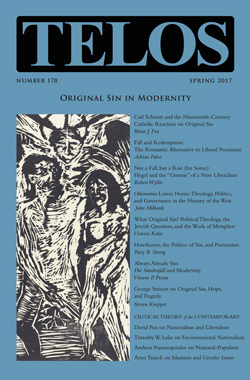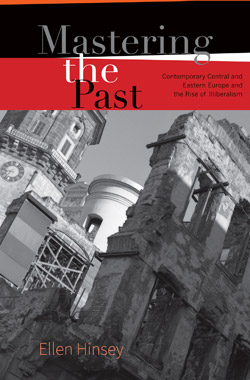Telos 178 (Spring 2017) is now available for purchase in our store.
 “If men were angels, no government would be necessary,” James Madison famously writes in Federalist No. 51. The defectiveness of the human will and the human intellect make government necessary, whether in John Calvin’s Sermon on the Galatians, which Madison echoes, in the locus classicus of this argument, Augustine’s City of God, or in book 9 of Plato’s Laws, which already describes humans’ innate capacity for evil as “a result of crimes long ago.” In modernity, Christian tropes like the Fall and original sin are used not only to justify political power, but also to temper utopian political goals. Reinhold Niebuhr emphasized the latter, for example, when he described the preference of the United States’ purportedly “Calvinist fathers” for relying upon checks and balances rather than the intelligence and goodwill of future American statesmen. Even the most familiar political analyses of original sin and the anthropology of Western Christianity contain this tension between justifying and limiting political power. “If men were angels, no government would be necessary,” James Madison famously writes in Federalist No. 51. The defectiveness of the human will and the human intellect make government necessary, whether in John Calvin’s Sermon on the Galatians, which Madison echoes, in the locus classicus of this argument, Augustine’s City of God, or in book 9 of Plato’s Laws, which already describes humans’ innate capacity for evil as “a result of crimes long ago.” In modernity, Christian tropes like the Fall and original sin are used not only to justify political power, but also to temper utopian political goals. Reinhold Niebuhr emphasized the latter, for example, when he described the preference of the United States’ purportedly “Calvinist fathers” for relying upon checks and balances rather than the intelligence and goodwill of future American statesmen. Even the most familiar political analyses of original sin and the anthropology of Western Christianity contain this tension between justifying and limiting political power.
Continue reading →
By Telos Press · Friday, March 10, 2017 Writing for Reuters News, John Lloyd considers Central Europe’s growing contempt for the European Union. The history and prospects for Central and Eastern Europe are very much at the heart of Ellen Hinsey’s new book Mastering the Past: Contemporary Central and Eastern Europe and the Rise of Illiberalism, which Lloyd discusses in his analysis: “In her recent book Mastering the Past, Ellen Hinsey writes of the ‘specters of populism, nationalism, extreme-right militantism and authoritarianism – released from their historical deep freeze’, stalking through the area…”
Continue reading →
By Andrew M. Wender · Wednesday, March 8, 2017 If the phrase “asymmetrical warfare” is taken to connote scenarios where “one side is possessed of overwhelming power with respect to its adversary,” together with manifold embodiments “of asymmetry in media representations, ideology, religion, sub- and supra-national actors, the environment and even psychology,” then there would appear little doubt that today’s world is pervaded by such conflict. Necessarily, the unique historical conditions of the present, globalizing era—with its fragmenting as well as revanchist states, and its dizzying technological accelerations—are evoked by “new wars” that embroil a proliferation of non-state actors, along with states who believe that they should rightly monopolize (or be immune from, as the case may be) such asymmetrical modalities as nuclear arsenals, mercenary forces, drones, cyberattacks, and propaganda innovations.
Continue reading →
By Telos Press · Wednesday, March 1, 2017 New from Telos Press: Ellen Hinsey’s Mastering the Past: Contemporary Central and Eastern Europe and the Rise of Illiberalism. Order your copy in our online store, and save 20% on the list price by using the coupon code BOOKS20 during the checkout process.
 Over the last decade Ellen Hinsey has traveled across Central and Eastern Europe researching a critical shift in the European political landscape: the rise of illiberalism. A quarter of a century after the changes of 1989—and as former Soviet sphere societies come to terms with their histories—the specters of populism, nationalism, extreme-right parties, and authoritarian rule have returned in force. Through a series of eyewitness reports, Mastering the Past offers an insider’s view of key political events, including the 2012 Russian elections, the Polish presidential plane crash in Smolensk, and Prime Minister Viktor Orbán’s vision for a new Hungary. Hinsey explores the darkening hour of European politics with an incisive mind and an eye for detail, recording the urgent danger that illiberalism represents for the new century. Over the last decade Ellen Hinsey has traveled across Central and Eastern Europe researching a critical shift in the European political landscape: the rise of illiberalism. A quarter of a century after the changes of 1989—and as former Soviet sphere societies come to terms with their histories—the specters of populism, nationalism, extreme-right parties, and authoritarian rule have returned in force. Through a series of eyewitness reports, Mastering the Past offers an insider’s view of key political events, including the 2012 Russian elections, the Polish presidential plane crash in Smolensk, and Prime Minister Viktor Orbán’s vision for a new Hungary. Hinsey explores the darkening hour of European politics with an incisive mind and an eye for detail, recording the urgent danger that illiberalism represents for the new century.
Continue reading →
By Martin Bolle · Tuesday, February 28, 2017 The definition of asymmetry in asymmetrical warfare could, it seems, contribute to illuminating the link between war and politics, or war and peace. For Clausewitz, “War is a simple continuation of politics by other means.” Now, we could ask: what is the politics of asymmetrical warfare? Still following Clausewitz, war is “a wide-scale duel” and, as a duel or fight, war “takes two distinct forms: attack and defense.” Additionally, for Clausewitz, politics would be a form of “wide-scale commerce” between states. In his book Drone Theory, the French philosopher Grégoire Chamayou defines asymmetrical warfare as cynegetic (in other words, a form of hunt). He uses as an illustration the name of a recent model of unmanned vehicle: “the Predator,” le prédateur. But how can asymmetrical warfare be considered as war if the fight dynamic is absent? And if asymmetrical warfare is a manhunt, how could politics as commerce be possible?
Continue reading →
By Beau Mullen · Friday, February 24, 2017
This paper focuses on the modern practice of using law, both national and international, to achieve policy goals and political ends that usually are the result of tactical military action. Lawfare, as this practice is referred to, is now a crucial tactic in the modern era of international relations, where war is largely carried out in a far from traditional manner. Lawfare, then, is a unique form of irregular warfare that can be employed by nations against one another and against insurgents in asymmetrical conflicts at home and abroad. This new reliance on irregular and asymmetrical warfare generally and lawfare specifically is reflective of Hegel’s view of the end of history, particularly as articulated by Alexandre Kojève. Basically, that as individuals gain equal recognition, the mode of satisfying desire will necessarily take the form of law and bureaucracy.
Continue reading →
|
|
 “If men were angels, no government would be necessary,” James Madison famously writes in Federalist No. 51. The defectiveness of the human will and the human intellect make government necessary, whether in John Calvin’s Sermon on the Galatians, which Madison echoes, in the locus classicus of this argument, Augustine’s City of God, or in book 9 of Plato’s Laws, which already describes humans’ innate capacity for evil as “a result of crimes long ago.” In modernity, Christian tropes like the Fall and original sin are used not only to justify political power, but also to temper utopian political goals. Reinhold Niebuhr emphasized the latter, for example, when he described the preference of the United States’ purportedly “Calvinist fathers” for relying upon checks and balances rather than the intelligence and goodwill of future American statesmen. Even the most familiar political analyses of original sin and the anthropology of Western Christianity contain this tension between justifying and limiting political power.
“If men were angels, no government would be necessary,” James Madison famously writes in Federalist No. 51. The defectiveness of the human will and the human intellect make government necessary, whether in John Calvin’s Sermon on the Galatians, which Madison echoes, in the locus classicus of this argument, Augustine’s City of God, or in book 9 of Plato’s Laws, which already describes humans’ innate capacity for evil as “a result of crimes long ago.” In modernity, Christian tropes like the Fall and original sin are used not only to justify political power, but also to temper utopian political goals. Reinhold Niebuhr emphasized the latter, for example, when he described the preference of the United States’ purportedly “Calvinist fathers” for relying upon checks and balances rather than the intelligence and goodwill of future American statesmen. Even the most familiar political analyses of original sin and the anthropology of Western Christianity contain this tension between justifying and limiting political power. 


